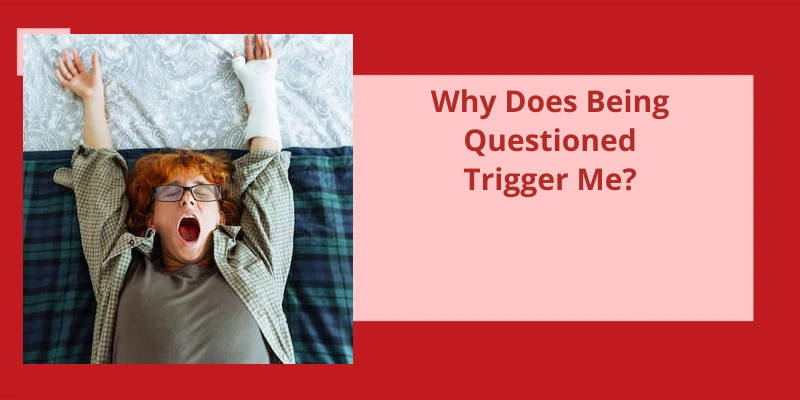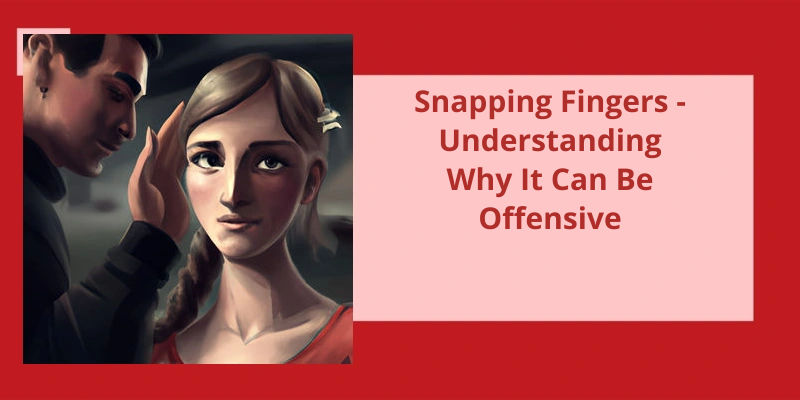The feeling of being triggered when questioned can stem from a variety of deeply personal factors and emotional responses. Some individuals may associate questioning with a perceived invasion of their privacy, triggering a defensive reaction as they strive to protect their personal boundaries. Others might find certain questions to be superfluous, perceiving them as a waste of time or an intrusion on their mental space. Additionally, specific types of questions may evoke feelings of insecurity or vulnerability, potentially triggering emotional discomfort. Understanding why being questioned triggers you is important for self-awareness and personal growth, as it allows you to address these triggers and explore strategies for managing them more effectively.
Why Do People Get Frustrated When I Ask Questions?
Asking questions is indeed an integral part of everyday conversation, allowing individuals to show interest, gain knowledge, and engage in meaningful discussions. However, it isn’t uncommon for some people to feel frustrated or triggered when faced with constant questioning. Several potential reasons may shed light on this phenomenon.
Firstly, individuals may feel annoyed or frustrated when questioned if they perceive the questions as nosy or intrusive. When someone probes into personal matters without considering boundaries or privacy, it can create a sense of discomfort and trigger defensive reactions.
Secondly, questioning can be perceived as rude or insensitive when it touches upon sensitive topics or triggers past traumas. Certain questions may inadvertently remind individuals of painful experiences, causing emotional distress and leading to defensive or hostile responses.
Another possible reason for frustration is when questions are manipulative or loaded with hidden agendas. When someone tactfully crafts their questions to manipulate or influence others opinions or actions, it can evoke a sense of suspicion or mistrust.
Additionally, individuals may feel triggered by questioning if they perceive it as offensive or judgmental. Questions that make assumptions, stereotype, or criticize can be hurtful and provoke defensive reactions in the person being questioned.
Lastly, someones frustration with questioning may stem from a lack of self-confidence or self-doubt. When constantly bombarded with questions, individuals might interpret it as a sign that their knowledge or abilities are being questioned, leading to feelings of insecurity or inadequacy.
Overall, while questioning plays a crucial role in communication, it’s essential to be mindful of the manner in which we ask questions. Respecting personal boundaries, showing sensitivity, and avoiding hidden agendas can contribute to more positive and constructive conversations, minimizing the chance of triggering frustration or annoyance in others.
Emotional Intelligence and Empathy: Exploring How Emotional Intelligence and Empathy Play a Role in Understanding Others’ Reactions to Questions and Responding Appropriately.
Emotional intelligence and empathy are crucial components in understanding and responding to others’ reactions when questioned. When someone is questioned, it can trigger various emotional responses depending on their individual traits, experiences, and insecurities.
People with higher emotional intelligence possess the ability to recognize and identify their own emotions, as well as those of others. This self-awareness helps them navigate challenging situations more effectively, allowing them to respond in a way that’s sensitive and considerate.
Empathy, on the other hand, involves the capacity to understand and share the feelings of another person. When individuals possess a strong sense of empathy, they’re better equipped to comprehend why being questioned might trigger a particular emotional response in someone else.
By incorporating emotional intelligence and empathy, individuals can develop a deeper understanding of the perspectives and emotions of others, allowing them to respond to questions in a supportive and respectful manner. This awareness can foster better communication, stronger relationships, and a more empathetic and inclusive society.
Asking a simple question and receiving an angry response can be a telling sign of unresolved issues or emotional instability. More often than not, this reaction suggests that innocuous situations may trigger an intense emotional response. Consequently, taking a step back and evaluating the situation may be necessary to avoid any further escalation or potential conflict.
What Does It Mean When Someone Gets Angry at a Question?
When someone gets angry at a question, it’s often a red flag indicating deeper issues. Anger in response to a simple inquiry could be a sign of underlying emotional or psychological distress. It suggests that there may be other innocent things that can trigger this individual, leading to increased conflict or tension in various situations.
Furthermore, anger at a question can also indicate a lack of effective communication skills. A person may feel attacked or misunderstood, resulting in a defensive response. It’s crucial to promote open dialogue and create a safe environment where questions can be asked without fear of judgment or anger.
Ultimately, it’s essential to acknowledge these signs of anger when confronted with a simple question. Continuing to push the individual may escalate emotions and potentially harm the relationship. Taking a step back, allowing for some time to cool off, and engaging in a calm discussion later on may be a more productive approach to addressing the underlying issues at play.
Exploring the Connection Between Anger at Questions and Feelings of Shame or Vulnerability
When someone is triggered by being questioned, it could be because it evokes feelings of shame or vulnerability. Questioning might make individuals feel as though they’re being judged or criticized, which can tap into their insecurities. This can lead to a defensive reaction, as anger can serve as a protective mechanism to mask deeper emotions. Exploring the underlying connection between anger and vulnerability can help individuals better understand and manage their triggers, fostering healthier communication and self-awareness.
Why Does My Partner Get Angry When I Ask a Question?
He may have experienced situations in the past where being questioned made him feel judged or criticized, leading to a defensive reaction. This could be rooted in his own personal insecurities or past traumas. It’s important to approach these conversations with empathy and compassion, seeking to understand his perspective without jumping to conclusions or making assumptions.
It might also be that your partner feels overwhelmed or stressed by the constant questioning, perceiving it as an invasion of his privacy or a lack of respect for his autonomy. Taking the time to have an open and honest conversation about boundaries and communication expectations can help alleviate these feelings and establish a healthier dynamic.
Furthermore, consider whether your own communication style might contribute to his reaction. Are the questions framed in a way that assumes wrongdoing or casts doubt on his intentions? Are they asked in a confrontational or accusatory manner? Reflecting on your own approach can help create a more collaborative and supportive environment for both of you.
It’s essential to foster a relationship built on trust, where both partners feel secure and respected. This means creating a space where open dialogue is encouraged, and concerns can be addressed without fear of judgment or anger. Exploring the root causes behind your partners reaction to questions can help uncover underlying issues that may need to be addressed in order to strengthen the foundation of your relationship.
Remember, effective communication is key in any relationship. By practicing active listening, expressing your own needs and concerns, and working together to find common ground, you can navigate these triggers and build a stronger, more understanding partnership.
Many people experience anxiety when faced with questions from others, stemming from the fear of making a mistake or saying something wrong. However, underlying this fear is a deeper concern of being judged or rejected by those around us. If you find yourself in this situation, it’s important to know that you aren’t alone in experiencing social anxiety.
Why Do I Get Anxious When People Ask Me Questions?
Many people experience anxiety when faced with questioning or interrogation. This anxiety can be caused by a variety of factors, such as a fear of being put on the spot, not knowing the right answers, or feeling judged by others. It’s important to recognize that these feelings are normal and natural, but they can also be addressed and managed.
Beneath the fear of saying or doing something wrong lies a deeper fear of being judged or rejected. This fear stems from a basic human need for acceptance and belonging. We all have a natural desire to be liked and validated by others, and any perceived judgment or criticism can be deeply unsettling. Being questioned can trigger these fears, as it puts individuals in a position of vulnerability and potential judgment.
If you find that being questioned triggers anxiety, it’s essential to remember that you aren’t alone. Many people struggle with social anxiety and fear of judgment. Identifying and acknowledging these feelings is the first step towards managing them. Seeking support from a therapist or participating in anxiety-reducing techniques, such as deep breathing or visualization exercises, can also be beneficial.
Strategies for Managing Anxiety During Questioning: Providing Specific Techniques and Strategies, Such as Positive Self-Talk or Mindfulness Exercises, That Individuals Can Use to Reduce Their Anxiety in These Situations.
- Practice positive self-talk
- Engage in mindfulness exercises
- Deep breathing exercises
- Progressive muscle relaxation
- Avoid caffeine
- Visualize success
- Focus on the present moment
- Challenge negative thoughts
- Take breaks and engage in self-care
- Seek support from others
Source: Why do I get nervous sometimes when people ask any …
Conclusion
It could be a result of feeling like our privacy is being invaded, provoking a sense of vulnerability and discomfort. Additionally, the frustration may stem from a dislike for repetitive and seemingly purposeless questions that feel like a waste of time. Moreover, specific questions that strike a chord with our insecurities may intensify these trigger reactions. It’s crucial to recognize and understand these triggers in order to navigate interpersonal interactions with greater self-awareness and empathy for others.






